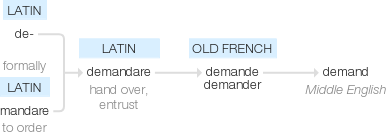Demand
Middle English (as a noun): from Old French demande (noun), demander (verb), from Latin demandare ‘hand over, entrust’ (in medieval Latin ‘demand’), from de- ‘formally’ + mandare ‘to order’.
wiktionary
From late Middle English demaunden, from Old French demander, from Latin dēmandō, dēmandāre.
etymonline
demand (v.)
late 14c., demaunden, "ask questions, make inquiry," from Old French demander (12c.) "to request; to demand," from Latin demandare "entrust, charge with a commission" (in Medieval Latin, "to ask, request, demand"), from de- "completely" (see de-) + mandare "to order" (see mandate (n.)).
Meaning "ask for with insistence or urgency" is from early 15c., from Anglo-French legal use ("to ask for as a right"). Meaning "require as necessary or useful" is by 1748. Related: Demanded; demanding.
demand (n.)
late 13c., demaunde, "a question," from Old French demande, from demander "to request; to demand" (see demand (v.)). Meaning "a request, a claim, an asking for by virtue of a right or supposed right to the thing sought," also "that which is demanded or required, exaction as a tribute or concession," without reference to right, is from c. 1300.
In the political economy sense of "desire to purchase and possess, coupled with the means to do so" (correlating to supply) it is attested from 1776 in Adam Smith. Meaning "state of being sought after" (especially by consumers) is from 1711. In demand "much sought after" is attested by 1825; on demand "on being requested" is from 1690s.
